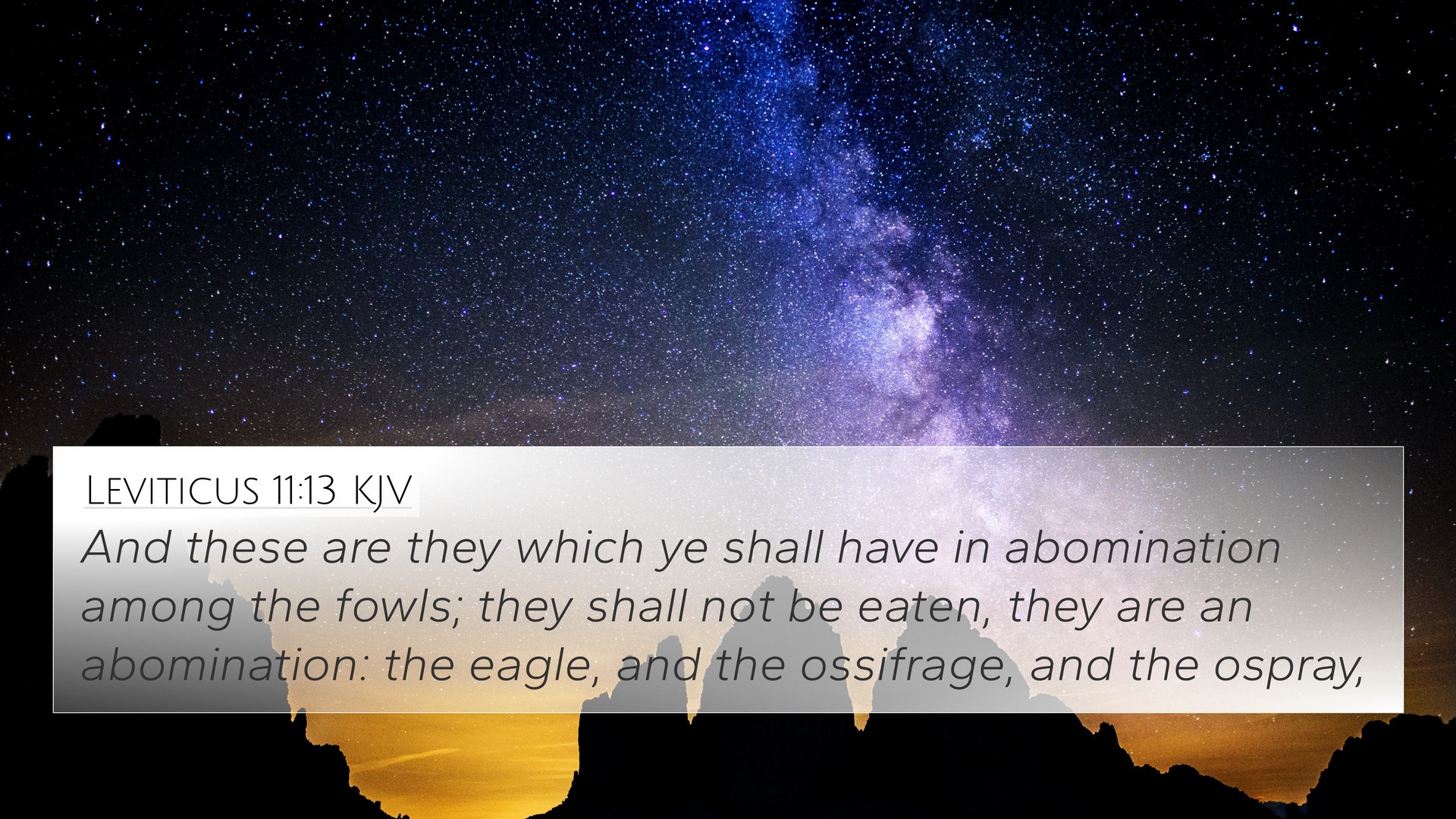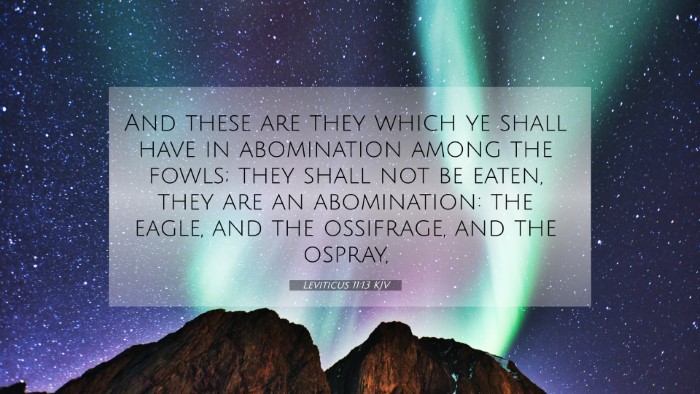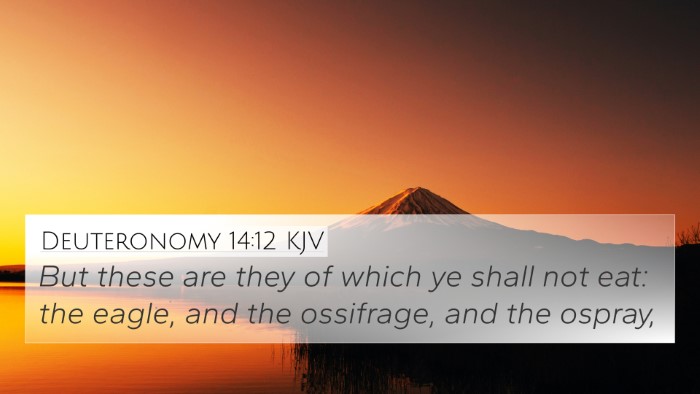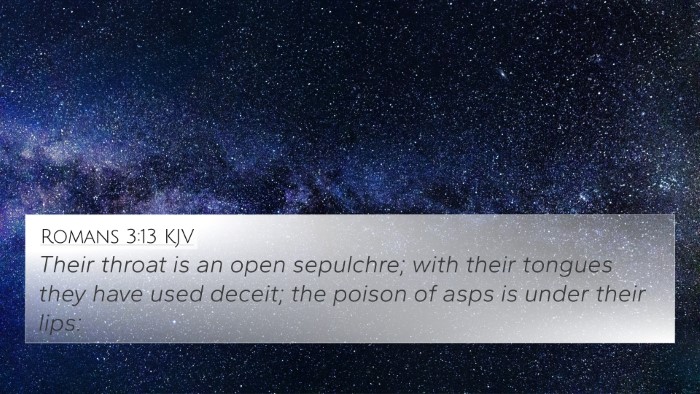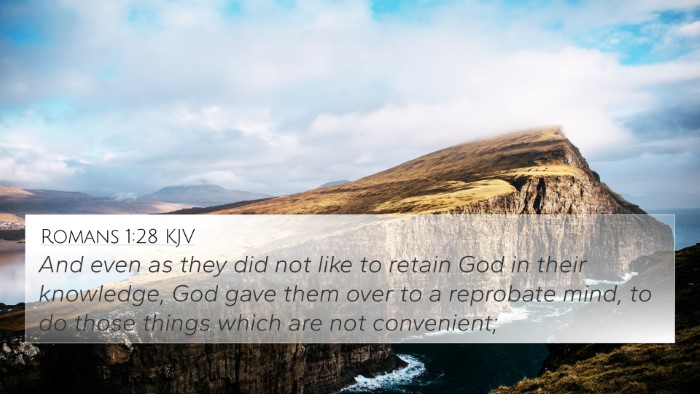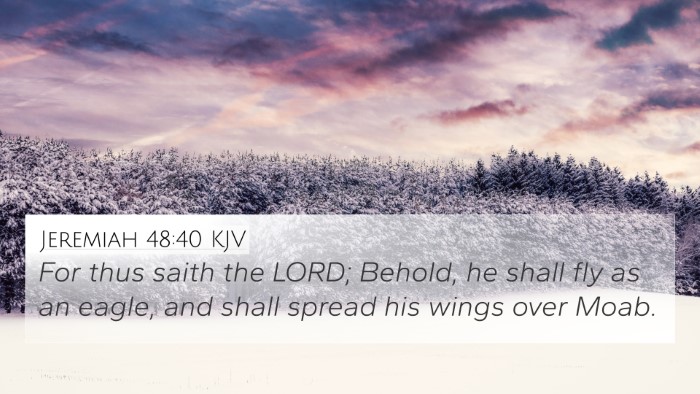Meaning and Interpretation of Leviticus 11:13
Verse Context: Leviticus 11:13 states, "And these are they which ye shall have in abomination among the fowls; they shall not be eaten, they are an abomination: the eagle, and the ossifrage, and the oz Feathered, and the vulture.
Summary of Biblical Significance: This verse is part of the dietary laws given to the Israelites. It highlights the distinctions between clean and unclean animals, specifically birds deemed unclean. These distinctions were pivotal in establishing holiness and obedience to God’s commandments among His people.
Key Insights from Public Domain Commentaries
Matthew Henry's Commentary
Matthew Henry explains that the prohibitions found in Leviticus 11 serve to separate Israel from the nations around them. He emphasizes that the birds listed as abominations symbolize moral and spiritual truths. The eagle, a bird of prey, represents a lifestyle contrary to God's will. By avoiding these birds, the Israelites not only maintained physical cleanliness but also fostered a deeper relationship with God, reflecting His purity.
Albert Barnes' Notes
Albert Barnes adds that understanding God's dietary laws goes beyond mere physical health. He discusses how these practices were intended to instruct Israel in holiness and reverence for their Creator. The unclean birds serve as a reminder of what is spiritually dangerous. In this context, the identification of these creatures as unclean serves as a guide to form moral sensibilities, encouraging a lifestyle that aligns with divine principles.
Adam Clarke's Commentary
Adam Clarke iterates that the laws of dietary restrictions were also a means of social order. Containing the nature of these unclean birds serves to remind the Israelites of God’s governance over all creation. Clarke further analyzes the symbolic implications of the specified birds, noting how God's command to avoid these creatures reflects a commitment to divine instruction and societal discipline. Understanding these distinctions promotes wisdom and the pursuit of spiritual purity.
Bible Cross References
- Deuteronomy 14:12-18 - Further details on clean and unclean birds.
- Isaiah 40:31 - Symbolic use of eagles in strength and waiting on the Lord.
- Matthew 7:6 - "Do not give what is holy to the dogs; nor cast your pearls before swine." Reflects the concept of what to avoid.
- Acts 10:12-15 - Peter’s vision, relating to unclean animals and God’s declaration of clean.
- 1 Timothy 4:4-5 - All created things are good if received with thanksgiving and sanctified.
- Proverbs 30:18-19 - Contrasting the ways of animals with human understanding.
- Revelation 18:2 - The symbolism of unclean spirits akin to unclean animals.
Thematic Connections and Interpretations
Examining Leviticus 11:13 in light of other scriptures unveils a rich tapestry of themes centered around purity, separation, and obedience. The concept of clean versus unclean animals transcends mere dietary regulations and speaks to the heart of one's spiritual condition and relationship with God.
This relational purity can be seen in:
- Holiness: The call to be holy as God is holy (Leviticus 20:26).
- Separation: The separation of God's people from the ways of the worldly (2 Corinthians 6:17).
- Wisdom: The discernment in choosing what pleases God (James 1:5).
Tools for Cross-Referencing
For those looking to dive deeper into the connections between Bible verses, utilizing tools such as a Bible concordance or a Bible cross-reference guide can greatly enhance one's study. These resources help identify similar themes, contexts, and teachings, fostering greater understanding of the interwoven nature of scripture.
Conclusion
In Leviticus 11:13, the instruction regarding unclean birds emphasizes not just dietary laws but a principle of holiness and separation for God's chosen people. By engaging in cross-referencing Biblical texts, believers can discover profound insights and inter-Biblical dialogue that highlights the enduring relevance of God's statutes in shaping moral and spiritual life.
